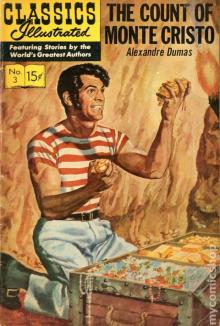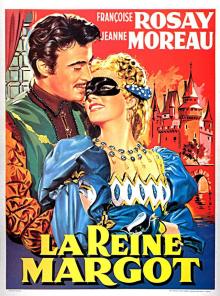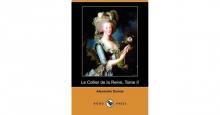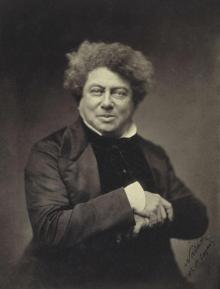- Home
- Alexandre Dumas
Une fille du régent. English Page 14
Une fille du régent. English Read online
Page 14
CHAPTER XIII.
MONSIEUR MOUTONNET, DRAPER AT ST. GERMAIN-EN-LAYE.
Dubois at once accosted the host.
"Monsieur," said he, timidly, "does Captain la Jonquiere lodge here? Iwish to speak to him."
"You wish to speak to him?" said the host, examining the new-comer fromhead to foot.
"If possible," said Dubois.
"Are you sure that is the person you want?" asked the host, who did notthink this was the man La Jonquiere expected.
"I think so," said Dubois modestly.
"A short, fat man?"
"Yes."
"Drinks his brandy neat?"
"That is the man."
"Always ready with his cane if he is not attended to directly!"
"Ah, that is Captain la Jonquiere!"
"You know him, then?"
"Not in the least," said Dubois.
"True, for you must have met him at the door."
"Diable! Is he out?" said Dubois, with a start of ill-humor badlyrepressed. "Thank you," and he called up an amiable smile.
"He has not been gone five minutes."
"But he is coming back?"
"In an hour."
"May I wait for him, monsieur?"
"Certainly, if you take something."
"Give me some brandy-cherries," said Dubois. "I never drink wine exceptwith meals."
The two guards exchanged a contemptuous smile.
The host hastened to bring the cherries.
"Ah!" said Dubois; "only five! At St. Germain-en-Laye they give six."
"Possibly, monsieur; for at St. Germain-en-Laye they have no excise topay."
"Yes, I forgot that," and he began to eat a cherry, which he could not,however, accomplish without a grimace.
"Where does the captain lodge?" asked Dubois.
"There is the door of his room; he preferred the ground-floor."
"Yes," murmured Dubois; "the windows look into the public road."
"And there is a door opening into the Rue des Deux-Boules."
"Oh, how convenient! And does not the noise annoy him?"
"There is another room above: sometimes he sleeps in one, sometimes inthe other."
"Like Denis the tyrant," said Dubois, who could not refrain from Latinor historical quotations.
"What?" said mine host.
Dubois bit his lip. At this moment one of the soldiers called for wine,and the host darted off to wait upon him.
Dubois turned to the two guards.
"Thank you," said he.
"What is it, bourgeois?" asked they.
"France and the regent," replied Dubois.
"The watchword!" cried both, rising.
"Enter this room," said Dubois, showing La Jonquiere's room. "Open thedoor into the Rue des Deux-Boules, and hide behind a curtain, under atable, in a closet, wherever you can. If, when I come in, I can see somuch as an ear, you will have no pay for six months."
The two men emptied their glasses, and entered the room, while Dubois,who saw they had forgotten to pay, put a piece of twelve sous on thetable, then, opening the window, and calling to the driver of a hackneycarriage standing before the door--"L'Eveille," said he, "bring thecarriage to the little door in the Rue des Deux-Boules, and tell Tapinto come up when I knock on the windows with my fingers; he has hisorders; be off."
The host reappeared.
"Hola!" cried, "where are my men?"
"A sergeant came and called them away."
"But they have not paid."
"Yes, they left a twelve-sou piece on the table."
"Diable! twelve sous; and my wine is eight sous the bottle."
"Ah!" said Dubois, "no doubt they thought that as they were soldiers youwould make a reduction."
"At any rate," said the host, consoling himself, "it is not all lost;and in our trade one must expect this kind of thing."
"You have nothing of the sort to fear with Captain la Jonquiere?"
"Oh, no, he is the best of lodgers; he pays without a word, and readymoney. True, he never likes anything."
"Oh, that may be his manner," said Dubois.
"Exactly."
"What you tell me of his prompt payment pleases me."
"Have you come to ask for money? He said he expected some one to whom heowed a hundred pistoles."
"No; on the contrary, I owe him fifty louis."
"Fifty louis! peste!" said the host, "what a pretty sum! Perhaps I wasmistaken, and he said receive, not pay. Are you the Chevalier Gaston deChanlay?"
"Does he expect the Chevalier Gaston de Chanlay?" said Dubois, with ajoy he could not conceal.
"He told me so," said the host. "Is that you?"
"No; I am not noble. I am called Moutonnet."
"Nobility is nothing," said the host. "One may be called Moutonnet andbe an honest man."
"Yes; Moutonnet, draper at St. Germain-en-Laye."
"And you have fifty louis for the captain?"
"Yes. In turning over some old accounts of my father's, I find he owedfifty louis to Captain la Jonquiere's father; and I have had no peacetill, instead of the father, who is dead, I had found the son."
"Do you know there are not many debtors like you?"
"The Moutonnets are all the same, from father to son. When we are owedanything we are pitiless. Listen. There is an honest fellow who owedMoutonnet & Son one hundred and sixty francs; my grandfather put him inprison, and there he has been for the three generations, and he has justdied there. I calculated that, during the thirty years he was there, hecost us twelve thousand francs; but we maintained the principle. But Ibeg your pardon for keeping you with all this nonsense; and here is anew customer for you."
"Ah!" said the host, "it is Captain la Jonquiere himself. Captain,"continued he, "some one is waiting for you."
The captain entered suspiciously--he had seen some strange, and, hethought, sinister faces about.
Dubois saluted him politely.
La Jonquiere asked the host if the friend he had expected had arrived.
"No one but monsieur. However, you lose nothing by the exchange, sinceone was to fetch away money, and the other brings it."
La Jonquiere, surprised, turned to Dubois, who repeated the same storyhe had told to the host, and with such success that La Jonquiere,calling for wine, asked Dubois to follow him into his room.
Dubois approached the window, and quietly tapped on it with his fingers.
"But shall I not be in the way in your room?" asked Dubois.
"Not at all, not at all--the view is pleasant--as we drink we can lookout and see the passers-by: and there are some pretty women in the Ruedes Bourdonnais."
They entered the room. Dubois made a sign to Tapin, who appeared in thefirst room, followed by two men, then shut the door behind him.
Tapin's two followers went to the window of the common room, and drewthe curtains, while Tapin placed himself behind the door of Jonquiere'sroom, so as to be hidden by it when it opened. The host now returnedfrom La Jonquiere's room, to write down the receipt for the money whichLa Jonquiere had just paid him for the wine, when Tapin threw ahandkerchief over his mouth, and carried him off like a feather to asecond carriage standing at the door. One of the men seized the littlegirl who was cooking eggs, the other carried off the servant, and soonthey were all on the way to St. Lazare, drawn by two such good horsesthat it was evidently not a real hired car.
Tapin remained behind, and taking from a closet a calico apron andwaistcoat, signed to a loiterer who was looking in at the window, andwho quickly transformed himself into a publican.
At this moment a violent noise was heard in the captain's room, as of atable thrown down with bottles and glasses; then oaths, then theclinking of a sword, then silence.
Presently a carriage was heard rolling away up the Rue de Deux-Boules.Tapin looked joyous.
"Bravo," said he, "that is done."
"It was time, masters," said the pretended publican, "for here is acustomer."

 The Count of Monte Cristo, Illustrated
The Count of Monte Cristo, Illustrated Knight of Maison-Rouge
Knight of Maison-Rouge![The Three Musketeers - Alexandre Dumas - [Full Version] - (ANNOTATED) Read online](http://i1.bookreadfree.com/14/the_three_musketeers_-_alexandre_dumas_-_[full_version]_-_annotated_preview.jpg) The Three Musketeers - Alexandre Dumas - [Full Version] - (ANNOTATED)
The Three Musketeers - Alexandre Dumas - [Full Version] - (ANNOTATED) The Man in the Iron Mask
The Man in the Iron Mask The Count of Monte Cristo (Penguin Classics eBook)
The Count of Monte Cristo (Penguin Classics eBook) Count of Monte Cristo (abridged) (Barnes & Noble Classics Series)
Count of Monte Cristo (abridged) (Barnes & Noble Classics Series) The Women's War
The Women's War La reine Margot. English
La reine Margot. English The Vicomte de Bragelonne
The Vicomte de Bragelonne__english_preview.jpg) La dame aux camélias (Novel). English
La dame aux camélias (Novel). English The Count of Monte Cristo
The Count of Monte Cristo Balsamo, the Magician; or, The Memoirs of a Physician
Balsamo, the Magician; or, The Memoirs of a Physician Ten Years Later
Ten Years Later The Romance of Violette
The Romance of Violette The Mesmerist's Victim
The Mesmerist's Victim Vingt ans après. English
Vingt ans après. English Le collier de la reine. English
Le collier de la reine. English Taking the Bastile; Or, Pitou the Peasant
Taking the Bastile; Or, Pitou the Peasant The Hero of the People: A Historical Romance of Love, Liberty and Loyalty
The Hero of the People: A Historical Romance of Love, Liberty and Loyalty Louise de la Valliere
Louise de la Valliere Les Quarante-cinq. English
Les Quarante-cinq. English Ange Pitou (Volume 1)
Ange Pitou (Volume 1) The Royal Life Guard; or, the flight of the royal family.
The Royal Life Guard; or, the flight of the royal family. Les trois mousquetaires. English
Les trois mousquetaires. English Une fille du régent. English
Une fille du régent. English The Knight of Maison-Rouge
The Knight of Maison-Rouge The Count of Monte Cristo (Unabridged Penguin)
The Count of Monte Cristo (Unabridged Penguin) Ange Pitou
Ange Pitou The Romance of Violette (vintage erotica)
The Romance of Violette (vintage erotica) The Three Musketeers
The Three Musketeers Three Musketeers (Barnes & Noble Classics Series)
Three Musketeers (Barnes & Noble Classics Series) Georges
Georges Man in the Iron Mask (Barnes & Noble Classics Series)
Man in the Iron Mask (Barnes & Noble Classics Series) The Red Sphinx
The Red Sphinx